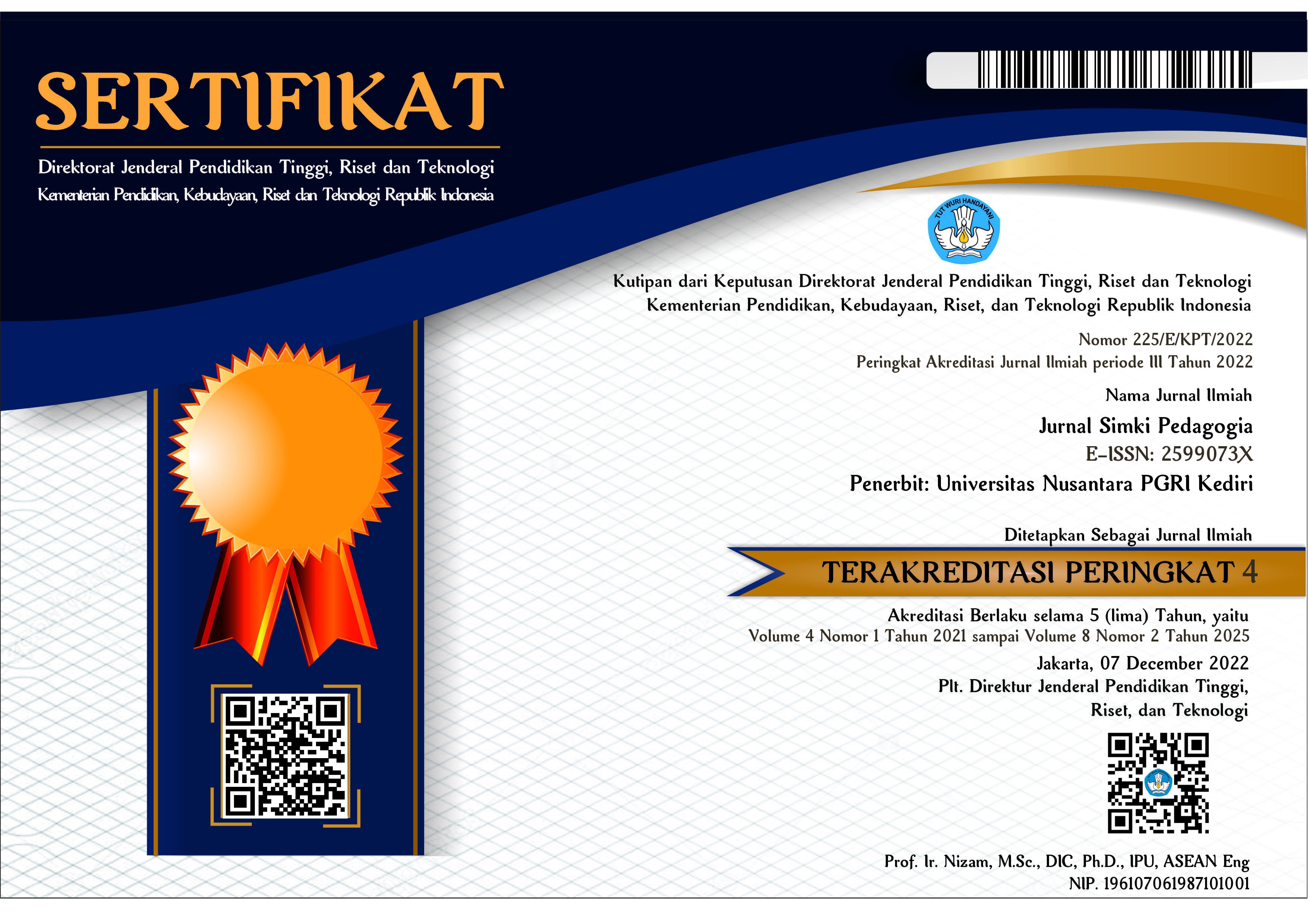Peranan Lingkungan Sekolah dan Kemampuan Berkomunikasi Guru Terhadap Motivasi Belajar Siswa
 Abstract views: 4111
,
Abstract views: 4111
,
 PDF (Bahasa Indonesia) downloads: 3957
PDF (Bahasa Indonesia) downloads: 3957
Abstract
This study aims to analyze and determine the effect of the school environment and teacher's communication skills on students' learning motivation. The sample in this study was 120 respondents who were taken purposively. The students who were used as respondents were third grade students. The analysis tool is multiple linear regression. The findings obtained are the school environment and the teacher's communication skills have a significant influence partially and simultaneously on students' learning motivation. The school environment has the most dominant influence on students' learning motivation.
Downloads
References
Ames, C., & Archer, J. (1988). Achievement goals in the classroom: Students’ learning strategies and motivation processes. Journal of Educational Psychology, 80(3), 260–267.
Arum, S. (2019). Pendidikan Dasar dan Perkembangannya, Spektrum Nusa Press, Jakarta.
Baskoro, T. (2018). Strategi Belajar Mengajar, Addar Press, Jakarta.
Church, M. A., Elliot, A. J., & Gable, S. L. (2001). Perceptions of classroom environment, achievement goals, and achievement outcomes. Journal of Educational Psychology, 93(1), 43–54.
Cunningham, D. J. (1992). Beyond educational psychology: Steps toward an educational semiotic. Educational Psychology Review, 4(2), 165–194
Darmawan, H. A. (2017). Pendidikan Karakter, Bumi Aksara, Bandung.
Darmawan, D. (2014). Pengaruh Kompetensi dan Semangat Kerja terhadap Prestasi Kerja Guru, Jurnal Ilmiah Manajemen Pendidikan Indonesia, Vol.1 No.1 September, 1-14
Gibbs, G., & Simpson, C. (2004). Conditions under Which Assessment Supports Students’ Learning. Learning and Teaching in Higher Education, 1(1), 3–31.
Gijbels, D., & Dochy, F. (2006). Students’ assessment preferences and approaches to learning: can formative assessment make a difference? Educational Studies, 32(4), 399–409.
Garcia, T., & Pontrich, P. R. (1996). The effects of autonomy on motivation and performance in the college classroom. Contemporary Educational Psychology, 21 (4), 477-486.
Greene, B. A., Miller, R. B., Crowson, H. M., Duke, B. L., & Akey, K. L. (2004). Predicting high school students’ cognitive engagement and achievement: Contributions of classroom perceptions and motivation. Contemporary Educational Psychology, 29(4), 462–482.
Gunawan, A. (2015). Motivasi dan Hasil Belajar, Spektrum Nusa Press, Jakarta.
Herrington, J., Reeves, T. C., & Oliver, R. (2014). Authentic Learning Environments. In J. M. Spector, M. D. Merrill, J. Elen, & M. J. Bishop (Eds.), Handbook of Research on Educational Communications and Technology (pp. 401–412). Springer New York.
Lilly, B., & Tippins, M. J. (2002). Enhancing student motivation in marketing classes: Using students’ management groups. Journal of Marketing Education, 24 (3), 253-264.
Loyens, S. M. M., & Gijbels, D. (2008). Understanding the effects of constructivist learning environments: introducing a multi-directional approach. Instructional Science, 36(5-6), 351–357.
Mahyanaila, R. (2016). Manajemen, Addar Press, Jakarta.
Mardikaningsih, R. (2014). Metode Pembelajaran dan Variasi Penerapannya, Jurnal Ilmiah Manajemen Pendidikan Indonesia, Vol.1 No.1 September, 43-54.
Mardikaningsih, R. (2014). Faktor-Faktor yang memengaruhi Prestasi Belajar Siswa. Jurnal Ilmu Pendidikan, Volume 8 Nomor 1, Mei, 13-24.
McKeachie, W. J. (1990). Research on college teaching: The historical background. Journal of Educational Psychology, 82, 189-200.
Purwanti, S., T. Palambeta, D. Darmawan, S. Arifin. (2014). Hubungan Metode Pembelajaran dan Motivasi Belajar Siswa, Jurnal Ilmu Pendidikan, Volume 8 Nomor 1, Mei, 37-46.
Roeser, R. W., Midgley, C., & Urdan, T. C. (1996). Perceptions of the school psychological environment and early adolescents’ psychological and behavioral functioning in school: The mediating role of goals and belonging. Journal of Educational Psychology, 88(3), 408–422.
Sinambela, E. A. (2014). Motivasi Belajar dan Disiplin Belajar serta Pengaruhnya terhadap Hasil Belajar Siswa. Jurnal Ilmu Pendidikan, Volume 8 Nomor 2, November, 91-104.
Stipek, D. J., Salmon, J. S., & Givven, K. B. (1998). The value of practices suggested by motivation research and promoted by mathematics education reformers. Journal of Research in Mathematics Education, 29 (4), 465-488.
Walker, S. L., & Fraser, B. J. (2005). Development and Validation of an Instrument for Assessing Distance Education Learning Environments in Higher Education: The Distance Education Learning Environments Survey (DELES). Learning Environments Research, 8(3), 289–308.
Wang, M. C., Haertel, G. D., & Walberg, H. J. (1990). What Influences Learning? A Content Analysis of Review Literature. The Journal of Educational Research, 84(1), 30–43.
Young, M. R. (2005). The motivational effects of the classroom environment in facilitating self-regulated learning. Journal of Marketing Education, 27 (1), 25-40.
Yuliana. (2012). Dinamika Pendidikan di Indonesia, IntiPresindo Pustaka, Bandung.
Copyright (c) 2021 Didit Darmawan, Fayola Issalillah, Eli Retnowati, Donny Richard Mataputun

This work is licensed under a Creative Commons Attribution 4.0 International License.

Jurnal Simki Pedagogia : https://jiped.org/index.php/JSP/index is licensed under a Creative Commons Attribution 4.0 International License.
















